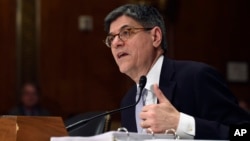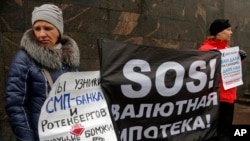U.S. Treasury chief Jack Lew warned Wednesday against the excessive use of economic sanctions on other countries to change their behavior, saying they could imperil the U.S. role in the world economy.
The United States has imposed sanctions on foreign countries for decades, most recently successfully to push Iran into negotiations to block its development of nuclear weaponry and so far unsuccessfully to overturn Russia's takeover of Ukraine's Crimean peninsula. The U.S. and European sanctions, along with very low world oil prices, have helped push the Russian economy into a recession, but Moscow maintains full control of Crimea.
Lew, in a Washington speech to the Carnegie Endowment for International Peace, adopted a measured view of the effectiveness of economic sanctions.
"Sanctions should not be used lightly," Lew said. "We must be conscious of the risk that overuse of sanctions could undermine our leadership position within the global economy, and the effectiveness of our sanctions themselves."
Wary of alternatives to US preeminence
Lew said there is a risk "that sanctions overreach will ultimately drive business activity from the U.S. financial system." Lew said that "could become more acute if alternatives to the United States as a center of financial activity, and to the U.S. dollar as the world's preeminent reserve currency, assume a larger role in the global financial system."
"Our central role must not be taken for granted," he warned. "If foreign jurisdictions and companies feel that we will deploy sanctions without sufficient justification or for inappropriate reasons - secondary sanctions in particular - we should not be surprised if they look for ways to avoid doing business in the United States or in U.S. dollars."
The sanctions aimed at Iran in connection with its nuclear program have been eased, but Lew said the U.S. still maintains other sanctions against Tehran related to its support of terrorism, missile testing and human rights violations.
"Since the goal of sanctions is to pressure bad actors to change their policy, we must be prepared to provide relief from sanctions when they succeed," Lew said. "If we fail to follow through, we undermine our own credibility and damage our ability to use sanctions to drive policy change.... Since Iran has kept its end of the deal, it is our responsibility to uphold ours in both letter and spirit."





